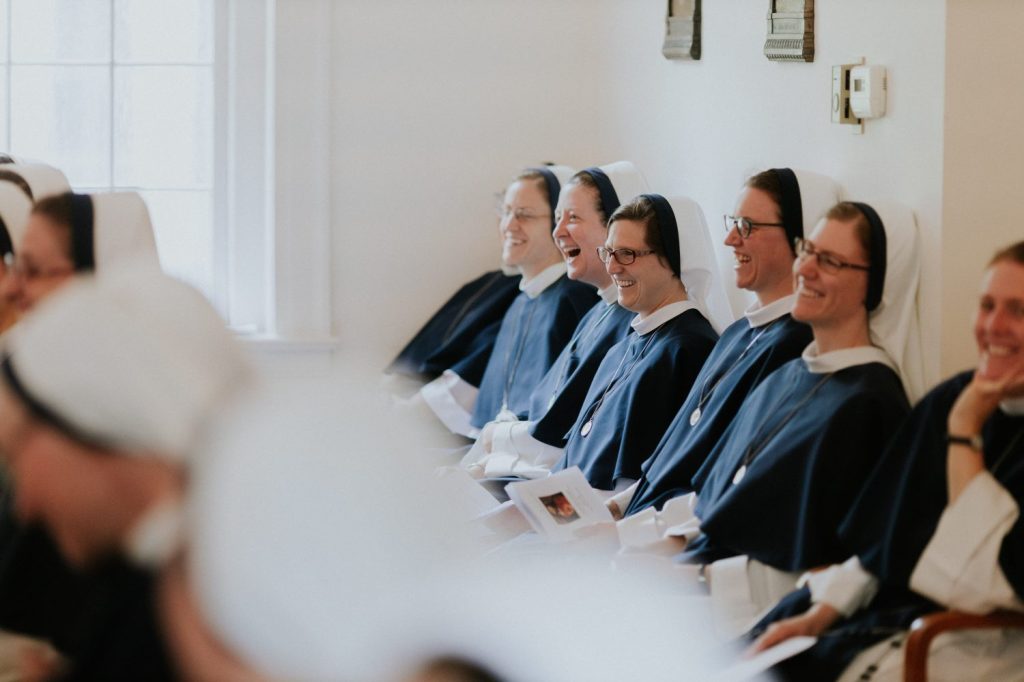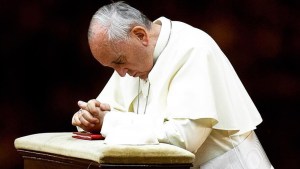Among all the Hillbilly Thomists’ soul-catching, foot-stomping bluegrass hits, one of their lesser known songs, “Keep Your Lamps Trimmed,” has reigned as my favorite. My Sisters know that every time I play it, I play it twice. The song focuses on preparing for the coming of the Bridegroom, like the wise and prudent virgins. But theirs isn’t the only catchy song about waiting. Years ago, Mumford and Sons shook the world with “I Will Wait.” Other artists have likewise captured the reality — which is admittedly a hard one — of waiting.
In the season of Advent, we become more alive to the reality that we are people in a state of waiting. Longing is more accurate. Longing for what? We look forward to the Lord’s second coming, where He will set everything in perfect order. Externally, and internally.
But even more immediate is our longing for Him to powerfully break into our reality today— the drudgery of our work day, the tensions in our relationships, the weaknesses of our own hearts. Sometimes our burdens feel like they’re crushing us, and we can’t help but cry out in exasperation, “Where are you, Lord?” Yet, Jesus exhorts us,
“Be dressed for action and have your lamps lit; be like those who are waiting for their master to return from wedding banquet, so that they may open the door for him as soon as he comes and knocks. Blessed are those slaves whom the master finds alert when he comes: truly, I tell you, he will fasten his belt and have them sit down to eat, and he will come and serve them. If he comes during the middle of the night, or near dawn, and finds them so, blessed are those slaves. (Luke 12:35-28)
A nephew of one of our Sisters was preparing for his upcoming trip to Legoland by watching a movie about the acclaimed park with his siblings and mom. When the movie was over, while his siblings rejoiced at the adventure that was to come, he began to cry. “Honey, what’s wrong? Why are you sad?” his mom inquired. He responded, “Because we’re not there right now!”
There is a deep longing in our hearts to be in our true homeland, Heaven, where we will finally “see Him as He is.” Where we will possess Him, and be possessed by Him completely, without a veil. But for now, we lean on the grace of faith, trusting that His promises are real in the darkness of our lives. That somehow, even though we can’t see Him, He’s here. We can be even more daring by believing He is closest to us than ever before in this darkness, much like how a child can’t see the face of the loving Father who is embracing them.
But why do we have to wait?
First, something remarkable happens in our waiting: Our hearts expand to receive the gift. Dutch psychiatrist Dr. Conrad Baars describes the wisdom of letting a child’s desire for a toy grow instead of buying it for instant gratification. One can only fully possess a good when desire has had space to mature. Allowing us to mature in our desire for Him forges a capacity to receive the gift of Himself, and actually, we can’t fully receive it if we aren’t prepared by longing.
And we see what comes as a result of waiting: “Truly, I tell you, [The Master] will fasten his belt and have them sit down to eat, and he will come and serve them.”
It’s almost like Jesus expresses not a reward, but a consequence of their disposition of heart. While it’s true that He loves us even before we develop our desire for Him, we grow in our ability to receive Him by keeping watch for Him. St. Augustine teaches that our hearts are enlarged to receive the gift through the gift of desire:
“The deeper our faith, the stronger our hope, the greater our desire, the larger will be our capacity to receive that gift, which is very great indeed.”
Second, keeping watch pleases the heart of God, especially the long suffering of waiting into the middle of the night, or toward daybreak — the darkest time, and the most exhausting. Yet, our acts of trust open the door to receive more grace to grow in faith. Granted, faith is a gift, yet it isn’t something that suddenly just appears one day. We must cooperate with grace and make acts of faith for it to grow, like a muscle.
Jesus told St. Faustina that her great trust in His mercy compelled Him to give big graces:
“The more a soul trusts, the more it will receive. Souls that trust boundlessly are a great comfort to Me, because I pour all the treasures of My graces into them. I rejoice that they ask for much, because it is My desire to give much, very much.”
Third, the ironic thing is that, if I’m searching for Him, it means I already have Him. How is that possible?
St. Bernard of Clairvaux tells us that if we’re seeking Him, it’s because we are first sought by Him. And if we long for Him, how much more He longs for us. We cannot produce the longing for Him in ourselves—it’s a gift. Which means if we are searching for Him, He is drawing us to do so. This takes a lot of faith to believe. Spiritual writers throughout the centuries have touched upon this period of darkness or aridity, knowing it to be a necessary stage of growth in the spiritual life, where we come to see Him as He really is. St. John of the Cross offers a consolation for us, seeing this search for God in the darkness as part of a divine romance, where God is drawing us to Him and preparing us for a greater union with Him through our longing.
How do we practice the art of waiting well?
Foster a Contemplative Outlook.
St. John Paul II shares the importance of cultivating a vision founded in faith, where we see the abundant generosity of our Creator in all things. When our hearts are brought to life through a sense of wonder, we develop a vision that receives reality as it really is, not as we’d like it to be. Fostering this vision by taking time to rejoice in the little gems of our day purifies our vision to see the trace of God Himself in all things, especially His intentional work in the fabric of our lives. Try going for a walk unplugged, taking intentional time to catch snowflakes on your tongue, or drinking a good cup of tea and really taking in the flavor.
Practice Praise and Gratitude.
Every best-selling self-help book seems to recognize gratitude as a key component for healthy living. What makes it so powerful? “Praise and thanksgiving purify the human heart because they turn it away from itself and toward God by expressing faith, hope, and love.” says Fr. Jacques Phillipe. Let’s be honest: It’s hard, and can even be painful to live in praise and gratitude when we’ve hit the wall. But praise and gratitude serve as shields that guard us from being overcome by bitterness and discouragement, and foster our growth in the theological virtues that draw us closer to God, whether we feel it or not. Make an act of faith. Choose a Scripture verse that inspires you with hope, and stick it on your mirror. There’s even a special power to whispering it out loud in hard moments.

Discernment of Spirits.
An important aspect of waiting is keeping vigilance in our own hearts, guarding our thoughts from the Enemy’s temptations; Satan wants nothing more than to tear us down with discouragement and despair when we’re wondering where God is. His key weapon is to hurl destructive thoughts into our minds that spiral us into a death-dealing grief: Things will never change. I will never change. The first step is to recognize these thoughts for what they are. You will know them by their fruits: Do they bring a spirit of peace, joy, and faith in God? Then they may be gifts from Him. But if they provoke anxiety and discouragement, those are the trademarks of the Evil One, or tokens of our broken human nature. Call on the powerful Name of Jesus, often. Or the intercession of Our Lady. For repeated negative thought patterns, bring them to the attention of someone you trust, especially a spiritual director or regular confessor.
We pray that during this Advent season, our hearts would be quickened to seek Him beneath the business of the holiday season. And His promise is sure: All who search for Him with their whole hearts will find Him (Jer 29:13).


